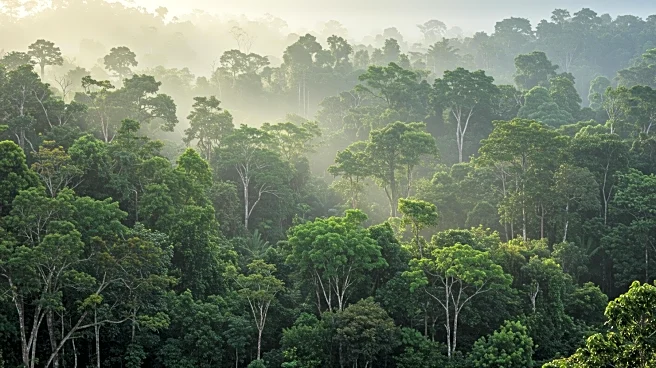What's Happening?
Brazil has reported a significant decrease in the area of the Amazon rainforest affected by fires, with a 65% reduction in July compared to the previous year. This data, provided by the MapBiomas monitoring platform, indicates that 143,000 hectares of the Amazon were burned last month, a substantial drop from the previous year when a severe drought led to record fire numbers. The reduction comes as Brazil prepares to host the COP30 UN climate change conference in Belem, with President Luiz Inacio Lula da Silva pledging to end Amazon deforestation by 2030. The decrease in fire damage is attributed to a more intense rainy season and increased surveillance, which has led to more cautious land clearance practices.
Why It's Important?
The reduction in Amazon fire damage is a positive development for Brazil as it prepares to host the COP30 climate summit, potentially strengthening its position in international environmental discussions. The decrease in deforestation and fire damage could enhance Brazil's credibility in its commitment to ending Amazon deforestation by 2030. This development may also influence global climate policy, as Brazil's actions could serve as a model for other countries facing similar environmental challenges. The reduction in fires could have significant implications for biodiversity conservation and climate change mitigation efforts, impacting global environmental strategies.
What's Next?
As Brazil gears up for the COP30 summit, the focus will likely be on further reducing deforestation and fire damage in the Amazon. The government may implement additional measures to ensure sustainable land management and prevent illegal land clearance. International stakeholders, including environmental organizations and other countries, may closely monitor Brazil's progress and commitments during the summit. The discussions at COP30 could lead to new agreements or collaborations aimed at enhancing global climate action and protecting vital ecosystems like the Amazon rainforest.
Beyond the Headlines
The reduction in Amazon fire damage highlights the complex interplay between environmental policies, economic activities, and climate conditions. It underscores the importance of sustainable land management practices and the role of government surveillance in preventing illegal activities. The situation also raises ethical considerations regarding the balance between agricultural expansion and environmental conservation. Long-term shifts in land use policies and climate resilience strategies may emerge from Brazil's efforts, influencing global environmental governance and sustainable development goals.









